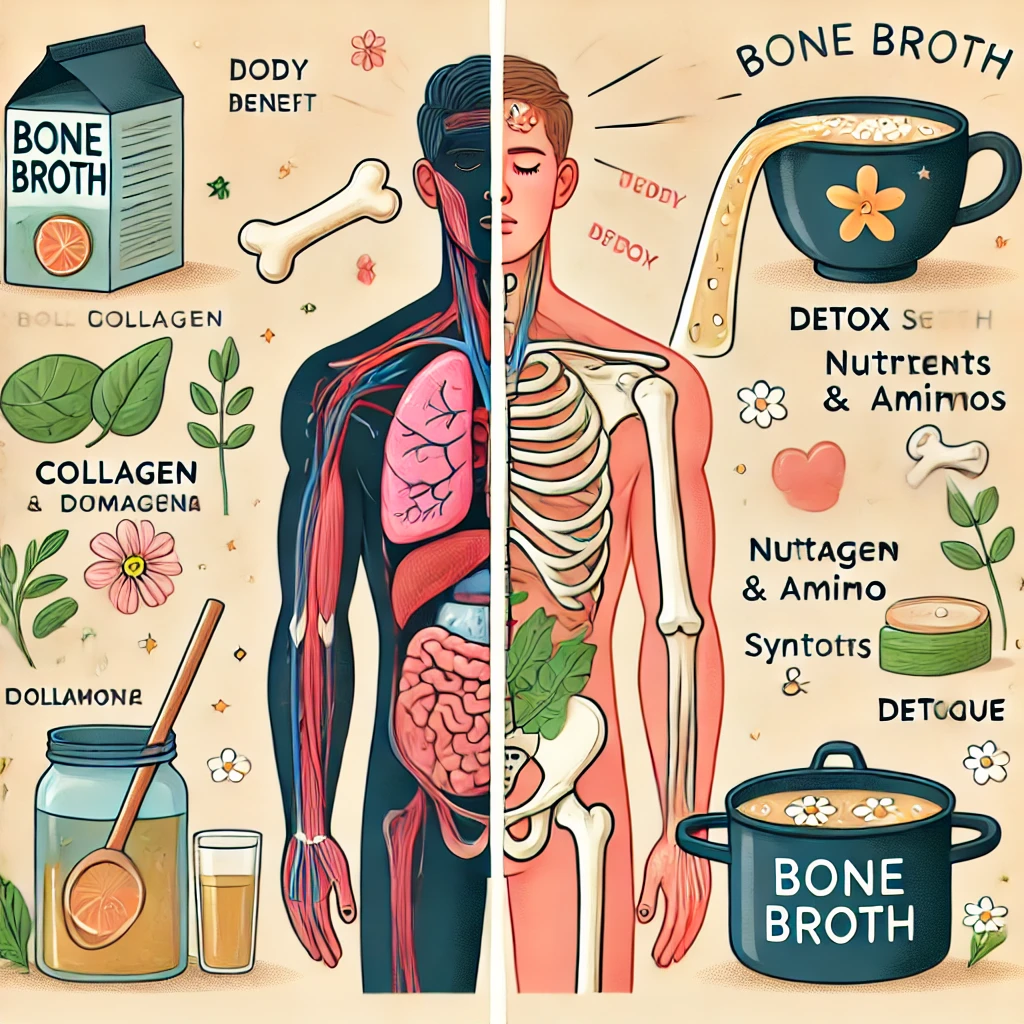Outline
Why Do I Feel Weird After Drinking Bone Broth?
Introduction
- Overview of the keyword: Chicken Bone Broth Recipe.
- Addressing potential discomforts some people feel after drinking bone broth.
Common Reasons for Feeling Weird After Drinking Bone Broth
- High Levels of Amino Acids
- Role of glutamine, glycine, and histidine in causing sensitivity.
- Detoxification Effects
- How bone broth may trigger temporary detox symptoms.
- Food Sensitivities
- Reactions to specific ingredients like spices or additives.
How to Identify What’s Causing Discomfort
- Listen to Your Body
- Tracking symptoms and patterns after drinking bone broth.
- Check the Ingredients
- Identifying potential irritants in homemade or store-bought broth.
Tips to Reduce Discomfort When Drinking Bone Broth
- Start Small and Gradual
- Drinking smaller portions to let your body adjust.
- Use High-Quality Ingredients
- Importance of organic bones and avoiding processed additives.
- Adjust Preparation Methods
- Skimming fat and impurities for a cleaner broth.
FAQs
- Can bone broth cause digestive issues?
- Is it normal to feel tired after drinking bone broth?
- What should I do if bone broth makes me nauseous?
Conclusion
- Reassure readers that bone broth is beneficial but requires adjustments for individual tolerances.
- Encourage experimenting with recipes like a Chicken Bone Broth Recipe to customize for comfort.
Why Do I Feel Weird After Drinking Bone Broth?
Introduction
Bone broth, especially a well-made Chicken Bone Broth Recipe, is celebrated for its numerous health benefits, including improved digestion, joint support, and enhanced skin health. However, some individuals report feeling “weird” or uncomfortable after drinking bone broth.
This article explores the possible reasons behind such reactions and provides practical tips to help you enjoy the benefits of bone broth without the side effects. Whether it’s a matter of ingredient sensitivity, detox effects, or preparation methods, understanding these factors can make bone broth a more comfortable part of your diet.
Common Reasons for Feeling Weird After Drinking Bone Broth
Although bone broth is packed with nutrients, some people may experience discomfort after consuming it. This can happen due to how your body reacts to the ingredients or the way the broth interacts with your system.

1. High Levels of Amino Acids
Bone broth is rich in amino acids like glutamine, glycine, and histidine, which are essential for health but may cause temporary sensitivity in some individuals.
- Why This Happens:
- Glutamine: May overstimulate the nervous system in sensitive individuals, leading to restlessness or jitteriness.
- Glycine: Known for its calming properties, but some people may feel unusually drowsy or fatigued after consuming it.
- Histidine: Can cause mild histamine-like reactions, such as headaches or itching, in histamine-sensitive individuals.
- What You Can Do:
- Start with small servings of bone broth to let your body adjust.
- Avoid drinking bone broth on an empty stomach if you’re prone to these reactions.
2. Detoxification Effects
Bone broth contains nutrients that support the liver and gut, helping your body detoxify. While this is generally beneficial, it may lead to temporary discomfort.
- Why This Happens:
- Nutrients like glycine promote liver detoxification, which can release toxins into your bloodstream for elimination.
- This process may cause symptoms like headaches, fatigue, or mild nausea as your body adjusts.
- What You Can Do:
- Stay hydrated to help flush out toxins more effectively.
- Gradually increase your intake of bone broth to minimize detox symptoms.
3. Food Sensitivities
Ingredients used in your Chicken Bone Broth Recipe—or even the bones themselves—could trigger sensitivities or mild allergic reactions.
- Common Triggers:
- Spices: Ingredients like garlic, onion, or pepper may irritate sensitive stomachs.
- Additives: Store-bought broths may contain preservatives or flavor enhancers that cause discomfort.
- Fat Content: Excess fat in broth can lead to digestive issues like bloating or diarrhea.
- What You Can Do:
- Use high-quality, organic ingredients to avoid hidden additives.
- Skim the fat from your broth to reduce greasiness and improve digestibility.
How to Identify What’s Causing Discomfort
If you feel “weird” after drinking bone broth, pinpointing the exact cause is key to resolving the issue. By observing your body’s reactions and examining the broth’s ingredients, you can make adjustments to enjoy the benefits of bone broth without discomfort.
1. Listen to Your Body
Your body provides valuable clues about what’s causing discomfort.
- Track Symptoms:
- Keep a journal of your reactions after drinking bone broth, noting symptoms like headaches, fatigue, nausea, or bloating.
- Record the time of day and portion size to identify patterns.
- Pay Attention to Timing:
- Reactions might vary depending on whether you consume broth on an empty stomach, with a meal, or later in the day.
2. Check the Ingredients
The ingredients in your bone broth might be contributing to your symptoms.
- Homemade Broth:
- Review the spices, herbs, and vegetables you’re using. Ingredients like garlic, onions, or certain spices may irritate sensitive stomachs.
- Ensure that the bones are from high-quality, organic sources to avoid contaminants.
- Store-Bought Broth:
- Check for added sodium, MSG, preservatives, or artificial flavorings. These can sometimes trigger adverse reactions.
3. Experiment with Changes
Making small adjustments can help identify and eliminate the source of discomfort.
- Vary Serving Sizes: Start with smaller portions and gradually increase the amount to let your body adjust.
- Modify Ingredients: Try omitting certain ingredients (like garlic or high-fat cuts) and see if symptoms improve.
- Switch Broth Types: If you’re sensitive to chicken bones, consider trying broth made from beef or fish bones to see if it works better for you.
Pro Tip: Testing these changes one at a time will help you identify the root cause of discomfort without unnecessary guesswork.
Tips to Reduce Discomfort When Drinking Bone Broth
If bone broth makes you feel “weird,” simple adjustments can help you enjoy its benefits without unpleasant side effects. Here are practical tips to reduce discomfort:

1. Start Small and Gradual
- Why It Helps: Your body may need time to adjust to the concentrated nutrients in bone broth, especially if it’s new to your diet.
- What to Do:
- Begin with small servings (¼ to ½ cup) and gradually increase the portion as your body acclimates.
- Spread your intake across the day instead of drinking a large portion at once.
2. Use High-Quality Ingredients
- Why It Helps: Poor-quality bones or additives in store-bought broths may cause adverse reactions.
- What to Do:
- Choose organic, pasture-raised chicken bones to avoid contaminants like heavy metals or antibiotics.
- Avoid store-bought broths with high sodium or artificial additives.
3. Adjust Preparation Methods
- Why It Helps: The way your broth is prepared can impact its digestibility and flavor profile.
- What to Do:
- Skim the Fat: Remove excess fat during cooking to reduce greasiness and potential digestive issues.
- Strain Thoroughly: Use a fine-mesh strainer to remove small bone fragments or impurities.
- Cook Low and Slow: Avoid boiling the broth, as high heat can create bitterness and make it harder to digest.
4. Customize the Recipe for Sensitivities
- Why It Helps: Some ingredients, like garlic or onions, might not agree with your stomach.
- What to Do:
- Stick to mild vegetables like carrots and celery if you’re prone to digestive issues.
- Use herbs sparingly and avoid overpowering spices in your Chicken Bone Broth Recipe.
5. Stay Hydrated
- Why It Helps: Bone broth’s detoxifying properties may temporarily dehydrate you or release toxins into your system.
- What to Do:
- Drink plenty of water throughout the day to help flush out toxins and maintain electrolyte balance.
Pro Tip: Test different adjustments one at a time, such as altering ingredient ratios or preparation methods, to find the perfect broth that works for you.
FAQs About Feeling Weird After Drinking Bone Broth
Here are answers to some common questions about discomfort related to drinking bone broth:
1. Can Bone Broth Cause Digestive Issues?
- Answer: Yes, for some individuals, bone broth can cause mild digestive issues like bloating or gas. This may happen if your body isn’t used to the nutrients or if the broth contains high amounts of fat or spices.
- Solution: Skim excess fat, avoid strong spices, and start with small portions to let your body adjust.
2. Is It Normal to Feel Tired After Drinking Bone Broth?
- Answer: Yes, the glycine in bone broth has calming effects on the nervous system, which can make you feel drowsy or relaxed.
- Solution: Drink bone broth in the evening if you notice it makes you sleepy.
3. What Should I Do if Bone Broth Makes Me Nauseous?
- Answer: Nausea might be caused by excess fat, high sodium levels, or certain ingredients like garlic or onions.
- Solution: Use low-fat bones, lightly season the broth, and strain it thoroughly. Avoid drinking broth on an empty stomach if it makes you nauseous.
4. Can Bone Broth Trigger Detox Symptoms?
- Answer: Yes, bone broth supports liver detoxification, which may temporarily cause headaches, fatigue, or mild nausea as your body eliminates toxins.
- Solution: Drink plenty of water and gradually increase your bone broth intake to minimize detox symptoms.
5. Could I Be Allergic to Bone Broth?
- Answer: While rare, some people may have sensitivities to specific amino acids or ingredients in bone broth, leading to symptoms like itching, bloating, or discomfort.
- Solution: Identify and eliminate problematic ingredients from your broth recipe and consult a healthcare professional if symptoms persist.
6. Why Does Store-Bought Bone Broth Affect Me Differently?
- Answer: Store-bought bone broths often contain high sodium, preservatives, or flavor enhancers like MSG, which can cause reactions.
- Solution: Opt for organic, low-sodium store-bought broths or make homemade broth to have full control over the ingredients.
7. Can Drinking Bone Broth on an Empty Stomach Cause Issues?
- Answer: For some, drinking bone broth on an empty stomach may lead to mild nausea or discomfort due to its concentration of nutrients.
- Solution: Start with a small portion or pair the broth with a light snack like crackers to reduce sensitivity.
8. Does Bone Broth Cause Headaches?
- Answer: In rare cases, headaches may occur due to the detoxification effects of bone broth or its histamine content.
- Solution: Drink plenty of water and ensure your broth is made with fresh, high-quality ingredients to minimize histamine reactions.
9. Is Fat Content in Bone Broth a Problem?
- Answer: High-fat content in bone broth can cause digestive issues like bloating or diarrhea, especially in those sensitive to fats.
- Solution: Skim the fat layer off the broth during or after cooking for a lighter, easier-to-digest drink.
10. Can Bone Broth Cause Allergic Reactions?
- Answer: Ingredients like certain herbs, spices, or vegetables may trigger allergic responses in some individuals.
- Solution: Stick to simple recipes and omit any ingredients that have caused allergies in the past.
11. Why Do I Feel Bloated After Drinking Bone Broth?
- Answer: Bloating can be caused by high levels of fat, certain spices, or your body adjusting to new nutrients.
- Solution: Remove excess fat, avoid strong spices, and introduce bone broth slowly into your diet.
12. Can Bone Broth Interact with Medications?
- Answer: While rare, high levels of certain minerals like potassium or sodium in bone broth could interact with medications for blood pressure or kidney conditions.
- Solution: Consult your doctor if you’re on medication and plan to consume bone broth daily.
13. Is Homemade Bone Broth Better for Sensitive Stomachs?
- Answer: Yes, homemade bone broth allows you to control ingredients, fat content, and seasoning, making it easier on sensitive stomachs.
- Solution: Prepare your broth with organic bones, minimal seasoning, and mild vegetables like carrots and celery.
14. Why Do I Feel Energized After Drinking Bone Broth?
- Answer: The amino acids, like glutamine and glycine, support muscle repair and boost metabolism, which may leave you feeling more energetic.
- Solution: Use this energy boost strategically by consuming broth as a mid-morning or pre-workout drink.
15. Can Bone Broth Trigger Histamine Reactions?
- Answer: Yes, slow-cooked bone broth can have higher histamine levels, which may cause symptoms like headaches or itching in sensitive individuals.
- Solution: Cook your broth for shorter periods (4-6 hours) or try fresh ingredients with lower histamine content.
Conclusion
Bone broth, especially a well-prepared Chicken Bone Broth Recipe, is a nutrient-rich addition to your diet. While it offers numerous health benefits, such as improved digestion, joint health, and better skin, some people may experience mild discomfort after drinking it. This can be due to factors like high amino acid levels, detox effects, or sensitivities to specific ingredients.
Key Takeaways
- Identify the Cause: Track your symptoms and adjust ingredients or portion sizes to find what works best for your body.
- Make Adjustments: Use high-quality bones, skim fat, and avoid overpowering spices to reduce potential discomfort.
- Start Small: Gradually introduce bone broth into your diet to allow your body to adapt to its nutrient density.
By tailoring your broth recipe and consumption habits to your needs, you can enjoy all the benefits of this comforting and nourishing beverage without any unwanted side effects. Experiment with your Chicken Bone Broth Recipe and sip your way to better health!

